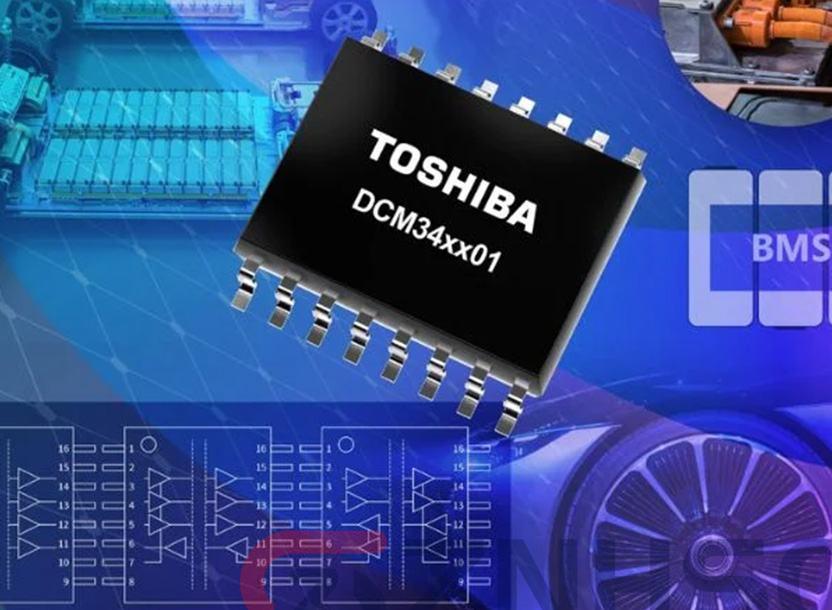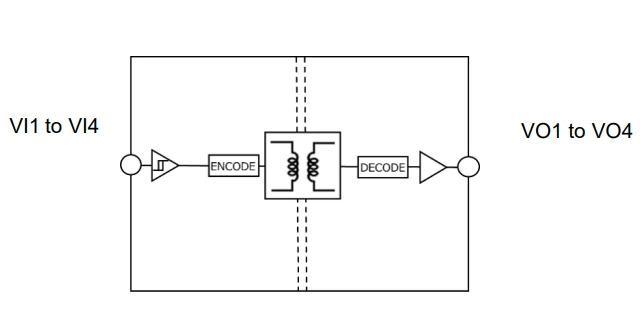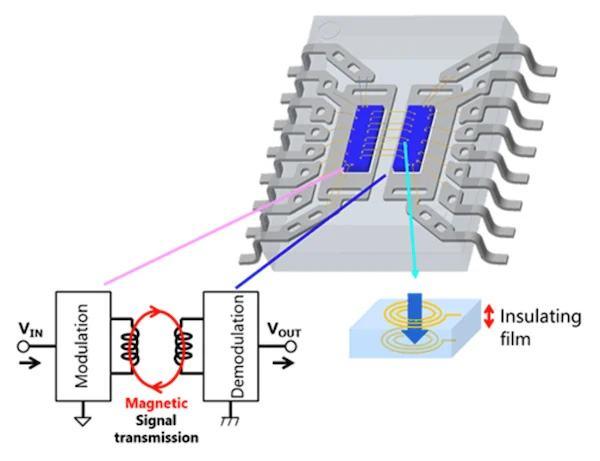Toshiba Releases Batch of 4-Channel High-Speed Isolators for Automotive
Toshiba has released a new series of four-channel digital isolators for automotive applications. As the automotive industry has transitioned to zonal architectures and high-voltage systems, it has raised the bar for isolation components; traditional optocouplers no longer meet performance or reliability standards.

The new DCM34xx01.
Toshiba designed its new series of digital isolators as a high-reliability isolation solution for modern automotive systems.
A Look at the DCM340C01
While the new family of digital isolators consists of ten variants, we’ll look at the DCM340C01 as the representative of the bunch.
The DCM340C01 (datasheet linked) is a quad-channel digital isolator that operates with magnetic coupling technology to insulate primary and secondary circuits. Achieving an isolation voltage of 5,000 Vrms, each of the four unidirectional channels transmits logic signals from input to output without a reverse path. The device supports supply voltages of either 3.3 V or 5 V and maintains default low outputs when unpowered to improve fail-safe behavior.

Application block diagram of the DCM340C01.
The device supports a maximum data rate of 50 Mbps and exhibits propagation delays of up to 18.4 ns at 5 V and 19.2 ns at 3.3 V. Channel skew is limited to 4.4 ns, which helps maintain timing integrity in multi-channel designs. The DCM340C01 also withstands ±100 kV/µs common-mode transients, has an output impedance of approximately 50 Ω, and has input thresholds set at standard CMOS levels.
Notably, the device’s power consumption scales with its data rate. At 5 V and 50 Mbps, the primary side draws up to 17.5 mA and the secondary side up to 22.2 mA. At 3.3 V, the current draw is slightly reduced. The device comes in a 16-pin SOIC wide-body package with a minimum creepage of 7.6 mm and a clearance of 8.0 mm.
It meets AEC-Q100 Grade 1 standards and maintains compatibility with UL1577 and CSA safety certifications.
Why Digital Isolators for Automotive?
Digital isolators are semiconductor devices that transfer digital signals across an isolation barrier while maintaining galvanic isolation between two circuits. They replace traditional optocouplers by using high-frequency electromagnetic coupling, often via capacitive or magnetic means, to transmit data across a dielectric material. This architecture eliminates the need for photodiodes and LEDs, which degrade over time and introduce non-linearities in high-speed or high-temperature environments.
In automotive systems, isolation protects low-voltage control electronics from high-voltage domains such as traction inverters. Digital isolators offer significant advantages in these applications: they support higher data rates and maintain signal integrity across wide temperature ranges without suffering from aging effects. Their lower propagation delay and tighter timing skew improve synchronization in real-time control systems.

Construction of a digital isolator.
Designers in the automotive industry also often prefer digital isolators because they better support modern architectures that prioritize compactness and power efficiency. While optocouplers require drive currents to bias an LED, digital isolators do not. Their compact form factor also simplifies PCB layout and enables integration into high-density modules.
In safety-critical systems like ADAS and battery monitoring, digital isolators offer better common-mode transient immunity and support functional safety requirements defined by ISO 26262. As more components in EVs and hybrid vehicles communicate digitally, the precision and stability of digital isolators make them an increasingly attractive choice.
Isolation for a Digitally Connected Drivetrain
As automotive systems become more software-defined and reliant on high-speed digital communication, isolation components must adapt to tighter constraints. Toshiba hopes that new devices like the DCM340C01 will free designers from tradeoffs between speed and safety. Toshiba’s DCM340C01 and its related variants are available now on Farnell.
Sign up to our newsletter
Receive our latest updates about our products & promotions
